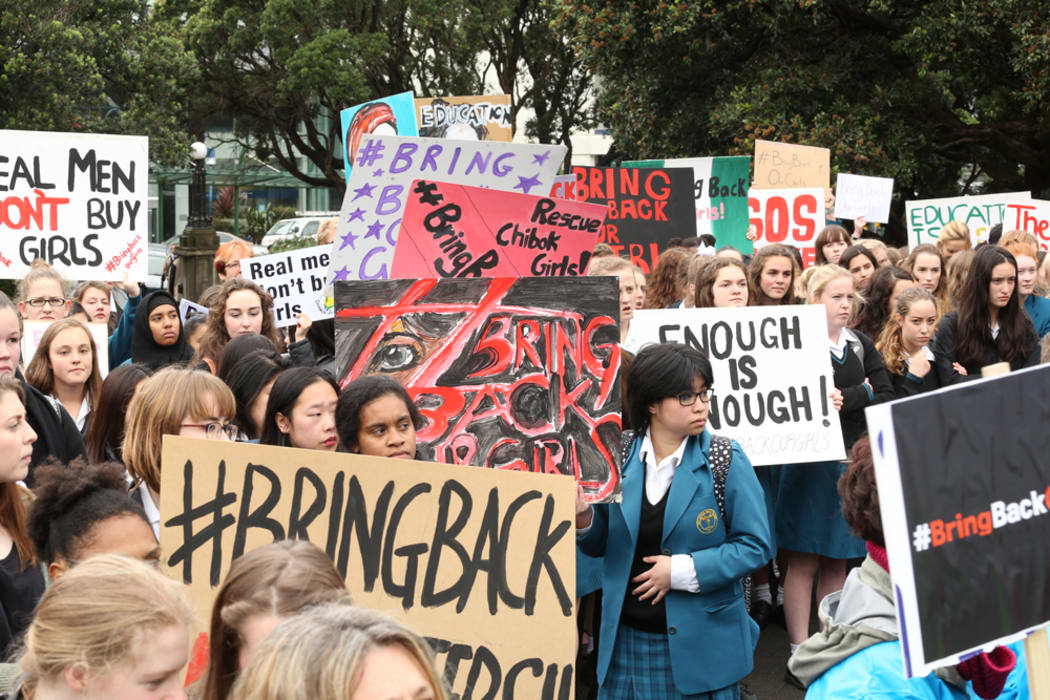I'm right on time for my revolution.

Wellington Girls' college students outside Parliament Photo: Lena Hesselgrave/The Wireless
If 2016 was the year of losing our heroes, 2017 has been the year of the contentious column.
From Duncan Garner's 'too many immigrants' in Kmart, to some guy from Dunedin's anger about Te Reo Māori last month, it did not seem there would be time for another.
Which is why I was so disappointed to read Damien Grant telling feminists how to be feminists on Sunday.
'I'm Damien and I'm a proud mansplainer' is a piece that explains why Grant feels he is the victim of condescending abuse at the hands of feminists.
Grant writes that the Patriarchy has gotten rid of all its unjust barriers, and that the only thing feminists have to "whine" about now is mansplaining.
Grant has hurt feelings.
Women are doing so well under the Patriarchy, Grant writes, because the "institutional barriers have long been swept away" and "The chief justice, the Governor-General and even the Queen are all women".
Therefore, he thinks, mansplaining is the only issue dealt with by third-wave feminists "who arrived three decades too late to their revolution".
Rape Prevention Education statistics show that in New Zealand: one in five women will experience sexual assault, one in three girls will have experienced these assaults before they are 13 years old, and the risk of these assaults are twice as high for Māori women.
According to Women's Refuge, up to 39 percent of women in New Zealand will face physical violence from someone known to them personally.
It is easy to assume institutional barriers aren't there when you implicitly gain from them, and do not know what it is like to be held back by them.
When Grant named three positions that women currently hold, he failed to mention that women make up less than half of our parliamentarians.
Where are the trans women, the women of colour, in what Grant thinks is now a matriarchy because: "Today, we find nothing odd about the prime minister wearing a dress".
Moving past the fact that the Prime Minister wearing a dress has nothing, at all, to do with women's rights, let's look at how the election of one person from a marginalised group is not enough to initiate an entire culture change.
America previously had an African-American president, but in the last year of his presidency; black youths were the demographic most killed by US police officers.
There is a significant difference between one person from a marginalised group reaching a position of power, and practically providing equal rights for that group everyday.
Let us also look to the media abuse that the dress-wearing Prime Minister faces.
Until Jacinda Ardern's election, I hadn't read anything about a Prime Minister's salary. However, several news outlets decided it was suddenly a huge deal that a young woman received an "astronomical pay rise", just the same as Prime Ministers before her.
Bill English's big pay cut and Jacinda Ardern's astronomical pay rise https://t.co/TUfDEHQVU0 (Via @IsobelEwing) pic.twitter.com/mj83xrDNaS
— Newshub Politics (@NewshubPolitics) October 26, 2017
People tended not to focus on the appearance of John Key, who was called a successful businessman, or Bill "the honest uncle" English. Ardern, however, has been called a "pretty communist", "horse-teethed" and "lipstick on a pig".
@jacindaardern @nzlabour Please can we make 'pretty communist' the next 'nasty woman'? #nzelection #nastywoman #prettycommunist #letsdothis pic.twitter.com/tpp7Pv0hSX
— Rachel Kerr (@thatswotRachsed) September 18, 2017
Ardern's election did not solve sexism overnight, her election has consistently highlighted how hard it still is for women.
"When a campaign has been reduced to whining about the way men speak ... it is time to disengage," Grant writes.
He doesn't seem very up to date with feminist news this year - our movement has focused mainly on the overwhelming numbers of women who are sexually abused, often in their workplace or by the men closest to them, and the fact that the current President of the United States boasts about grabbing women by the pussy.
Feminism is a movement seeking equality and rights for women. Grant thinks that feminism is about men, that our women's movement is focused on men.
Try again.

Photo: Screenshot
Men who feel victimised by feminism are prioritising men's feelings and reputations amidst a movement about the trauma that women face. His argument boasts an example of Not All Men Are Bad And I Am A Good Guy Why Are You Targeting Me. Grant feels victimised by feminism because he imposes the idea that the focus is him personally.
Subsequently, women's anger is viewed as dangerous because it is a threat to the stability of structured gender inequality that relies on women being passive and compliant.
Grant doesn't get to say what is "good" or "true" feminism, because he isn't a victim of the things that hurt women.
I was born into a world where boys will get my friends drunk at parties to use for their own pleasure, and boast that you can't be one of the boys unless you take advantage of a drunk girl.
I will have to support my friends while men on Facebook comment on the articles about these assaults, saying the girl was 'asking for it'.
I will hear the men in my workplaces rank my girl friends and me on a hierarchy of our looks.
I have been one of the 150 girls to go through Starship each year with anorexia nervosa - 95 percent of the sufferers of this illness are girls.
And I have to put up with men writing their thoughts on our movement because they still think they are the ones who get to determine whether or not our struggles are valid.
I am right on time for my revolution.

